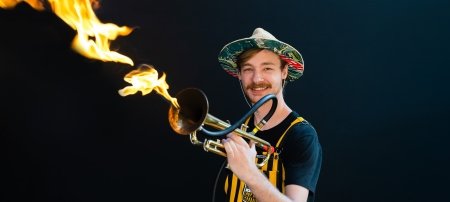Fear Factor: Students Discuss Underlying Drivers of Racism

Few things are scarier than change, and few emotions are more powerful than fear. Michigan Tech students in the summer reading seminar led Aug. 26 by humanities professor Robert Johnson batted around these and other concepts raised by the novel "Lay That Trumpet in Our Hands," with author Susan Carol McCarthy sitting in on the discussion.
The novel is the coming-of-age story of young Reesa McMahon, the daughter of an orange grower, set against an historical truth: a violent string of Klan bombings and lynchings that wracked Florida in 1951.
Florida has a reputation for palm trees and white sand beaches, but the truth is that it had more lynchings per capita than any other southern state and the Klan considered Florida to be a primary stronghold, McCarthy said. That's in part because of its history. Confederate soldiers fleeing Reconstruction sought refuge in Florida, at the time a wild and unsettled part of the country.
As the civil rights movement gained momentum, lynchings abated, but riots arose in the cities during the 1960s. What fueled the Klan violence and the riots? Johnson asked. Fear, said a student. "Who is fearful?" Johnson responded.
"Everybody." The Klan, the black community, white business owners. "After 9/11, there was fear of Middle Eastern types," said one student. Now we're afraid because of the economy, said another student, "and fear just makes it worse."
Behind all of these fears is the fear of change, McCarthy said. Back in 1951, the Klan feared that black enfranchisement was affecting the political process. "People in the power structure were afraid of losing control."
But what do we have to fear? the students asked. "Not getting our allowance for a week?" Compared to women in Afghanistan, refugees in the Sudan, "our worst day is better than their best day."
"People have always been afraid of change," said one student. That's because change produces uncertainty, McCarthy said. And the unknown, said another student.
In this all-white group, the discussion turned to perceptions of minority privilege. "It's hard when you see the advantages they have," said one. "Indians are the only ones who can own casinos." "My father said Michigan State had to accept a certain percentage of students from the UP," said another. "I wouldn't want to be accepted over someone who could do better."
Part of an education is being exposed to different points of view, McCarthy said. Bringing in students from different regions of the state provides diversity and a variety of cultural perspectives, an important part of a college education.
"How many of you have nonwhite friends?" McCarthy asked. Most hands went up. "Wonderful," she said. "You can learn so much from them."
"I love working with these kids," she said afterward. "It's my favorite part of my job." More than any generation before them, they seem to be letting go of prejudice and becoming truly color-blind. "I see them as a change-agent generation," McCarthy said.
Michigan Technological University is a leading public research university, conducting research, developing new technologies and preparing students to create the future for a prosperous and sustainable world. Michigan Tech offers more than 130 undergraduate and graduate degree programs in engineering, forestry and environmental sciences, computing, technology, business and economics, natural and physical sciences, arts, humanities and social sciences.
Michigan Technological University is a public research university founded in 1885 in Houghton, Michigan, and is home to more than 7,000 students from 55 countries around the world. Consistently ranked among the best universities in the country for return on investment, Michigan’s flagship technological university offers more than 120 undergraduate and graduate degree programs in science and technology, engineering, computing, forestry, business and economics, health professions, humanities, mathematics, social sciences, and the arts. The rural campus is situated just miles from Lake Superior in Michigan's Upper Peninsula, offering year-round opportunities for outdoor adventure.




Comments